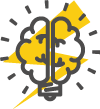Mara Krechevsky, Pedagogy of Play, Project Zero (or maybe John Dewey!)
Oh, the joys! We have just had a run of incredible “live” events in PressPlay and Learning Pioneers, including a co-live with Ron Berger and Trevor MacKenzie on building reflection and critique skills with students and a co-live with Ben Mardell and Mara Krechevsky in the Pedagogy of Play Project Zero team on structures to support play.
And, as usual, there is powerful overlap between these two “lives” and deep, provocative thinking.
This was a quote that really stood out to me and got me thinking. Mara Krechevsky from the Project Zero team shared:
“You don’t learn from experience, you learn from reflecting on experience.”
Mara thought John Dewey might have first said this … but, then again, it might have been her!
Mind. Blown.
This really got me thinking. I wondered: Is this really true? Do we learn the most, or indeed, everything, from reflection?! Is it that important?! And, if it is, it becomes ever-more key to pay very close attention to, gain conscious competence in and fine-tune how we are developing those reflection skills.
Three key ideas got me thinking about how central reflection is to learning. I’m still on the fence about whether it’s only reflection that brings about learning or whether experience is learning as well. I’m loving the cognitive dissonance this is causing!
Here are my three ideas about the importance of reflection for learning:
1. We learn LOADS from our mistakes.
In our interview with James Nottingham in Learning Pioneers (and throughout our “challenge” course together), James talked about the importance of learning from our mistakes:
We love the power of this video and refer to it often in Learning Pioneers.
First of all, I love the point James makes about how we behave as teachers – Yes, it’s important to celebrate our “wins” and what goes “right” in our teaching (we have a hard job as educators, celebration is so key to staying in a virtuous cycle!).
And, imagine a school culture where we celebrated and made time to learn from our mistakes – That would be powerful wouldn’t it?! How often do we go into the staffroom and exclaim, “I totally stuffed up that lesson!” Not to self-deprecate. To model having a positive attitude to mistake-making and, here’s the key, LEARNING from those mistakes – failing forwards.
Secondly, James speaks to the importance of the reflection process when we make mistakes – When things don’t go as planned, we are forced into a state of reflection:
- What was it that didn’t work?
- What could I tweak for next time?
- How could I pick this up, reframe it and try again?
Learning. Learning through reflection.
2. Plan-do-review – Or Review-plan-do
In PressPlay, we are collectively figuring out how to take play beyond Early Years. This is an exciting grapple within itself. As part of this grapple, we have been exploring the links between inquiry and play and how learning through a lens of inquiry can be a powerful “in” for more playful and play-based learning – Inquiry lends itself to play. Or more eloquently put, Kath Murdoch shared with us in one of her “lives” with our communities:
“Play is the purest form of inquiry.”
Beautiful. As a play advocate this quote makes my heart sing!
As part of our learning with Kath, she challenged us to reimagine the structure of our school days and suggested we start our days with a review.
In other words, start our days with reflection.
Because that reflection then becomes the driver for new learning.

I’ve often tried this when using Highscope’s Plan-do-review with my classes. By flipping the order to “review-plan-do”, as suggested by Julian Swindale who was my partner teacher at the time, I noticed that the children became more focused in general in their learning and also more focused on exactly: What their challenges were, how to overcome those challenges, what their next steps in learning were and how to go about achieving them.
Again, learning. Learning as a result of purposeful, focused reflection.
3. My own personal experience in growth
Those of you who know me or regularly read my blogs will know that I’m a huge fan of personal growth (here’s one of my blogposts on personal growth tips and my own personal growth journey). As Jaz Ampaw-Farr beautifully put it in our Learning Pioneers “live”:
“When do you ever stop becoming the best version of yourself?”
I’m 100% committed to my own growth and the growth of others around me – both professionally and personally (And nowhere is this expressed more profoundly with our communities in Learning Pioneers and PressPlay).
And, those of you who have been coached, mentored and/or had therapy – You will know that it’s through reflection (on past experiences, on how we have shown up, on how we habitually show up) that we undo old habits and patterns and learn new, more powerful and conscious ones to move forwards.
Learning to become the best version of ourselves is achieved through conscious attention to our own feelings and behaviours and reflection on the impact they have on us and those around us.
Learning through reflection.
So, the more I think about it, the more I am becoming convinced that this quote does indeed hold some weight:
“Learning doesn’t come from experience; it comes from reflection on experience.”
(Probably) Mara Krechevsky
What do you think?!
P.S. The Pedagogy of Play team have brilliantly released a new FREE PDF book with insights on developing play. You can check it out and download it here.



